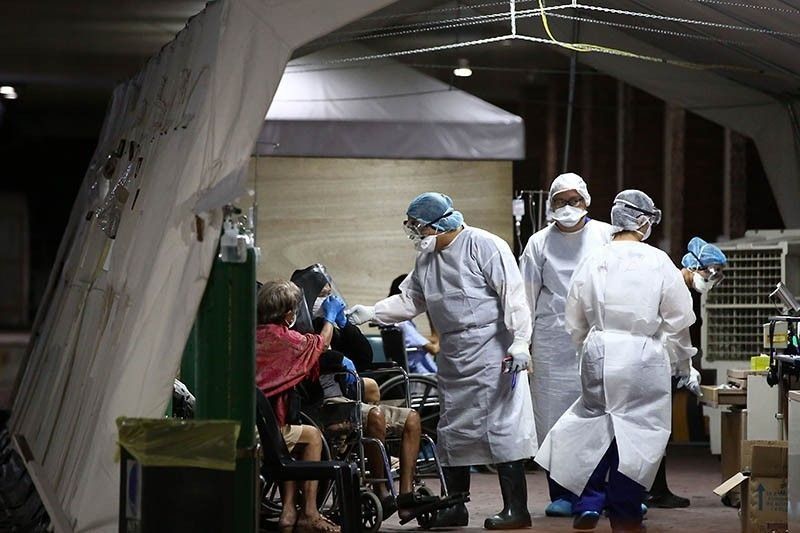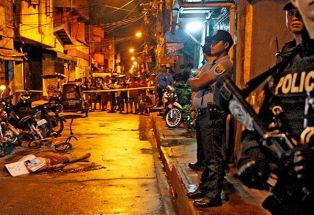DOH: Critical care capacity in 'danger zone'

MANILA, Philippines (Updated 9:23 p.m.) — The critical care capacity for intensive care unit (ICU) beds has reached the "danger" zone, the health department said Monday, as the number of persons infected with COVID-19 continues to rise.
Health Undersecretary Leopoldo Vega said the number of occupied isolation and ICU beds and mechanical ventilators for COVID-19 cases are increasing over time.
"Actually... the capacity right now, the critical bed capacity especially for the ICUs according to our data, is now in the danger zone and more than—that was about 70%," Vega said at a press briefing.
"We need to address this and we have to make sure that if ever there is a rise in the number of severe and critical patients, hospitals would be able to adjust in terms of providing critical care and expanding their intensive care units," he added.
Data presented by Vega showed that 573 out of 739 ICU beds have been occupied as of July 8.
"The (number of occupied) ICU beds is increasing gradually. This is one of the reasons why we came up with (a system for) hospital management so we can apportion the number of patients who are (going to) private (hospitals) and who cannot be given access so we can refer them to public institutions or other specialty centers that handle COVID," the health official said.
"We are trying to collaborate with the different health facilities so that we will work as a network and there’s a system to it...What is most important right now with this crisis, is that we need to come up with a system and move as one," he added.
Vega said the One Hospital system aims to set-up COVID-19 bed allocation guidelines to ensure effective minimum and surge capacity in hospitals; establish data dashboard to enhance visibility and planning of healthcare capacity; come up with a mechanism for admitting and discharging patients across facilities network; expedite treatment payment for COVID-19 patients; and provide forum for hospitals to discuss and resolve issues.
He said the immediate steps to be undertaken under the system are expanding hospital capacity by increasing COVID-19 bed allocations, providing additional health care personnel even for private hospitals; and providing supply augmentation for all hospitals.
In a statement late Monday evening, the National Kidney and Transplant Institute said that it had already reached the "danger zone" in bed capacity for COVID-19 patients.
"Despite our continuous efforts to ensure the safety and wellbeing of our employees, we still recorded significant increase in the number of infection rate among health care workers, particularly with our frontline personnel in the last two weeks," it also said.
It asked the public to refer COVID-19 cases to other facilities.
Earlier Monday, St. Luke's Medical Center and Makati Medical Center announced they can no longer accept new COVID-19 cases.
In the city of Manila, Chinese General Hospital and Medical Center and Tondo Medical have also said that they can no longer accept COVID-19 patients while San Lazaro Hospital has a limited capacity to take COVID-19 patients in.
UST hospital is also full.
RESOURCE: COVID-19 Emergency Info : Manila City
Testing capacity
At the same briefing, Vince Dizon, deputy chief implementer of the COVID-19 national policy, said the Philippines is on track to achieving its goal of conducting one million tests this month. He noted that the country now has 85 testing laboratories nationwide.
"Because of the higher number of laboratories... we are about to reach one million tests as of July 11. Maybe in the coming days, we will surpass one million tests," Dizon said.
Dizon said the government aims to conduct 10 million COVID-19 tests by next year. More than 16,000 tests are being conducted daily in Metro Manila, he added.
To carry out its strategy against the pandemic, the government has designated officials to lead each component of the response.
Dizon was named chief testing czar while Baguio City Mayor Benjamin Magalong was designated chief tracing czar. Vega, meanwhile, was named chief treatment czar while Public Works Secretary Mark Villar was designated chief isolation czar. All of them will work directly under the National Task Force Against COVID-19 led by chief implementer Carlito Galvez, Jr.
- Latest
- Trending
































